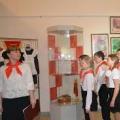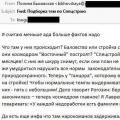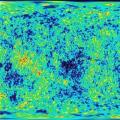– Nikolai Vasilyevich, wasn’t it written by you? Here it is: “Ah! patched, patched!” the man screamed. He also added a noun to the word patched, which is very successful, but not used in social conversation, and therefore we will skip it. However, one can guess that it was expressed very aptly, because Chichikov, although the man had long since disappeared from sight and had traveled a lot ahead, was still grinning while sitting in the chaise. The Russian people express themselves strongly! What is accurately spoken is the same as what is written; it cannot be cut down with an axe. And how accurate is everything that came out of the depths of Rus', where there are no Germans, no Chukhons, or any other tribes, and everything is a nugget itself, a lively and lively Russian mind that does not reach into its pocket for a word, does not hatch it , like a mother hen chicks, but it sticks right away, like a passport on an eternal sock, and there is nothing to add later, what kind of nose or lips you have - you are outlined from head to toe with one line! Just as a countless number of churches, monasteries with domes, domes, and crosses are scattered throughout holy, pious Rus', so a countless number of tribes, generations, and peoples crowd, build, and rush about the face of the earth. And every nation, bearing within itself a guarantee of strength, full of the creative abilities of the soul, its bright features and other gifts of God, each in its own way distinguished itself with its own word, with which, expressing any object, it reflects part of its own character in its expression. The word of a Briton will echo with heart knowledge and wise knowledge of life; The short-lived word of a Frenchman will flash and spread like a light dandy; the German will intricately come up with his own clever and thin word, which is not accessible to everyone; but there is no word that would be so sweeping, lively, would burst out from under the very heart, would boil and vibrate so much, like an aptly spoken Russian word.”
N.V. Gogol (wrinkling his face contentedly and somewhat coquettishly):
– Well, yes... And it’s not bad, I suppose?
(At the same time, Nikolai Vasilyevich hesitates and blushes.)
DW:
- That’s okay, the only question is, what word did people use to label Plyushkin? "A! patched, patched!” the man screamed. He also added a noun to the word patched, which is very successful, but not used in social conversation, and therefore we will skip it.” So what kind of “noun” is it, no secret?
N.V. Gogol (throwing up his hands, quoting himself):
– not used in small talk...
DW (talking to himself):
– “patched” – “patched” – “darned” – “darned”... (his face brightening). Gandon or what?!
N.V. Gogol (cunningly, like a recognized classic):
– In our time they were made from intestines... these necessary things were expensive... but they could be darned.;)
Just as a countless number of churches, monasteries with domes, domes, and crosses are scattered throughout holy, pious Rus', so a countless number of tribes, generations, and peoples crowd, motley, and rush about the face of the earth. And every nation, bearing within itself a guarantee of strength, full of the creative abilities of the soul, its bright characteristics and other gifts, each in its own way distinguished itself with its own word, with which, expressing any object, it reflects part of its own character in its expression. The word of a Briton will echo with heart knowledge and wise knowledge of life; The short-lived word of a Frenchman will flash and spread like a light dandy; the German will intricately come up with his own, not accessible to everyone, clever and thin word; but there is no word that would be so sweeping, that would burst out so smartly from under the very heart, that would seethe and vibrate as well as an aptly spoken Russian word. N.V.GOGOL"DEAD SOULS"

Our beautiful language, under the pen of uneducated and inexperienced writers, is quickly declining. Words are distorted. Grammar fluctuates. Spelling, this heraldry of the language, changes at the will of one and all.
Reading is the best teaching!/ A. S. Pushkin

Many Russian words themselves emit poetry, just as precious stones emit a mysterious shine... / K. G. Paustovsky

Take care of the purity of your language as a sacred thing! Never use foreign words. The Russian language is so rich and flexible that we have nothing to take from those who are poorer than us. / Ivan Sergeevich Turgenev

Russian language is the language of poetry. The Russian language is unusually rich in versatility and subtlety of shades. / French writer Prosper Merimee

The greatest wealth of a people is its language! For thousands of years, countless treasures of human thought and experience accumulate and live forever in the word. / Soviet writer M. A. Sholokhov

INTERVIEW WITH VASILIY IRZABEKOV ABOUT THE POWER OF THE RUSSIAN WORD
(excerpt)
— In your book “The Holy Power of the Word” there is a subtitle: “Do not betray the Russian language.”
- Yes, because we - almost all of us - betray him every day and every hour. This is a terrible situation: people who speak Russian today crucify their language and mock it. And he is alive - absolutely alive; he's in pain. We forget that God is the Word. And Christ was crucified not only 2000 years ago. We do this to this day with our sins, including when we mutilate the words of the Russian language, when we add trash words into it. I have a large mailbox, there are letters that are absolutely remarkable in their frankness, sincerity, and depth of thought. One believing woman from Vologda writes that after reading my “The Secret of the Russian Word” (this book went through seven editions with a total circulation of about 150,000 copies - ed.), she began to have a completely different attitude towards the Russian language. The church-going, adult woman began to pay attention to what she was saying. She writes that she was horrified by some of the slang expressions that had become commonplace for her. She was especially struck by the fact that when she wanted to convey their meaning in normal Russian, she couldn’t do it. This is true. One of my least favorite words in current Newspeak is the word “cool.” No one has ever explained to me the exact meaning of this word. It's fun"? Then just say: “fun.” Is this "perky"? So say “perky.” "Original"? Say "original." You know, there is such an unsafe genre - parody, and many weeds in our language arise when we parody someone. What is a parody? In essence, this is subtle mockery. Of course, this cannot be done without pride: if I parody someone, I make fun of him. But there is such an imperceptible moment when the mask sticks to the face. What unpleasantly amazes me: many adults, communicating on the Internet, write deliberately illiterately, mocking the Russian language, the word. Here is a photo showing a funny situation. And the comment (I know its author - he is an educated, developed person): “laughing” (!?)... This is all, of course, from the evil one.
“Indeed, we have lost the sacred connection between our words and the Word; we do not think about the words of Christ: “By your words you will be justified and by your words you will be condemned.” In the old days, Russian people, say merchants, did not give receipts. They gave their word. Millions of transactions were made without notary offices, legally formalized contracts, without any papers - the merchant’s word was enough. It was the highest guarantee, since behind it stood not only the honor of the merchant, but also his faith in the holiness of the word. To break the word you gave meant for an Orthodox Russian person to betray, to become like Judas. To break a word means to commit treachery, to break faith. You see, I am already finding examples confirming that Russian speech has an evangelical basis. Here’s another example: Paul Claudel, a French poet, playwright, one of the greatest religious writers of the 20th century, discovered that the Russian words “apple” and “devil” came from a common root.
— The famous German poet Rainer Maria Rilke said that all countries border on each other, and Russia borders on God.
— Another remarkable German, Walter Schubart, a man of tragic fate, whose name we would not know, perhaps, if the Russian philosopher Ivan Aleksandrovich Ilyin had not read about him in a big lecture in Berlin, wrote in the book “Europe and the Soul of the East”: “The Englishman looks at the world is like a factory, the Frenchman is like a salon, the German is like a barracks, the Russian is like a temple. The Englishman thirsts for booty, the Frenchman for glory, the German for power, the Russian for sacrifice. The Englishman expects benefits from his neighbor, the Frenchman expects sympathy, the German wants to command him. And only the Russian doesn’t want anything.” The Russian language is unusual, through it a lot happens in the soul - a Russian person begins to develop in it. That is why the neo-Banderots in Ukraine are so up in arms against the Russian language.
Happy is the traveler who, after a long, boring road with its cold, slush, dirt, sleep-deprived station guards, jangling bells, repairs, squabbles, coachmen, blacksmiths and all sorts of road scoundrels, finally sees a familiar roof with lights rushing towards him, and familiar people appear before him rooms, the joyful cry of people running out to meet them, the noise and running of children and soothing quiet speeches, interrupted by flaming kisses, powerful to destroy everything sad from memory. Happy is the family man who has such a corner, but woe to the bachelor!Happy is the writer who, past boring, disgusting characters, striking with their sad reality, approaches characters that demonstrate the high dignity of a person who, from the great pool of daily rotating images, has chosen only a few exceptions, who has never changed the sublime structure of his lyre, has not descended from the top to his poor, insignificant brothers, and, without touching the ground, he plunged entirely into his own exalted and far removed images. His wonderful destiny is doubly enviable: he is among them, as in his own family; and yet his glory spreads far and loudly. He smoked people's eyes with intoxicating smoke; he wonderfully flattered them, hiding the sad things in life, showing them a wonderful person. Everyone rushes after him, applauding, and rushes after his solemn chariot. They call him a great world poet, soaring high above all other geniuses of the world, like an eagle soaring above other high-flying ones. At his very name, young, ardent hearts are already filled with trembling, reciprocal tears sparkle in everyone’s eyes... There is no one equal to him in strength - he is a god! But this is not the fate, and the fate of the writer is different, who dared to call out everything that is every minute before the eyes and what indifferent eyes do not see - all the terrible, stunning mud of little things that entangle our lives, all the depth of the cold, fragmented, everyday characters with which ours teems. an earthly, sometimes bitter and boring road, and with the strong power of an inexorable chisel, who dared to expose them prominently and brightly to the eyes of the people! He cannot gather popular applause, he cannot bear the grateful tears and unanimous delight of the souls excited by him; a sixteen-year-old girl with a dizzy head and heroic enthusiasm will not fly towards him; he will not forget himself in the sweet charm of the sounds he emitted; he cannot, finally, escape from the modern court, the hypocritically insensitive modern court, which will call the creatures he cherished insignificant and base, will assign him a despicable corner among the writers who insult humanity, will give him the qualities of the heroes he depicted, will take away his heart, both the soul and the divine flame of talent. For the modern court does not recognize that glass that looks at the sun and conveys the movements of unnoticed insects is equally wonderful; for the modern court does not recognize that a lot of spiritual depth is needed in order to illuminate a picture taken from a despicable life and elevate it to the pearl of creation; for the modern court does not recognize that high, enthusiastic laughter is worthy to stand next to high lyrical movement and that there is a whole abyss between it and the antics of a buffoon! The modern court does not recognize this and will turn everything into reproach and reproach for the unrecognized writer; without division, without answer, without participation, like a familyless traveler, he will remain alone in the middle of the road. His field is harsh, and he will bitterly feel his loneliness.
And for a long time it was determined for me by the wonderful power to walk hand in hand with my strange heroes, to survey the whole enormously rushing life, to survey it through laughter visible to the world and invisible, unknown to it tears! And the time is still far off when, in another key, a menacing blizzard of inspiration will rise from the head, clothed in holy horror and brilliance, and in confused trepidation they will sense the majestic thunder of other speeches...
1. Read the text and analyze it according to the proposed plan. Find in the text examples of suffixal and prefixal ways of forming words. Tell us about other ways of word formation, give your own examples.
The Russian people express themselves strongly! And if he rewards someone with a word, then it will go to his family and posterity and to St. Petersburg and to the ends of the world.
Just as a countless number of churches, monasteries with domes, domes and crosses are scattered throughout holy, pious Rus', so a (countless) multitude of tribes of generations of peoples are multicolored and rushing about the face of the earth. And every nation that carries within itself a guarantee of strength full of the creative abilities of the soul 3 of his bright features and other gifts of God, each was uniquely cast in his own word which, expressing any object, reflects in his expression a part of his own character. the knowledge of life will echo with the lightness of the word of the Frenchman; the (un)durable word of the Frenchman will flash and scatter; it would be so sweeping..it would be so smart, it would burst out from under the very heart, it would be boiling and lively..petting 2 like an aptly said..Russian word.
KV. Gogol
The Russian people express themselves strongly! And if he rewards someone with a word, then it will go to his family and posterity, and to St. Petersburg and to the ends of the world.
Just as a countless number of churches, monasteries with domes, domes, crosses are scattered throughout holy, pious Rus', so a countless number of tribes, generations, peoples crowd, variegate and rush about the face of the earth. And every people, bearing within itself a guarantee of strength, full of the creative abilities of the soul, its bright features and other gifts of God, each in its own way distinguished itself with its own word, with which, expressing any object, it reflects part of its own character in its expression. The word of a Briton will echo with heart knowledge and wise knowledge of life; The short-lived word of a Frenchman will flash and spread like a light dandy; the German will intricately come up with his own clever and thin word, which is not accessible to everyone; but there is no word that would be so sweeping, lively, would burst out from under the very heart, would seethe and vibrate so much, like a well-spoken Russian word.
In this excerpt from the poem by N, V. Gogol's "Dead Souls" many words are formed suffixal in a way, for example, noun in a word - word plus suffix -ets, since this is a neuter word with an emphasis on the ending, E is a fluent vowel, so it is dropped.
Noun a bunch of derived from the word a lot of using a suffix -esst.
Short Communion scattered derived from the verb scatter using a suffix -n-
Prefix Many parts of speech are formed in this text, for example: adjective short-lived formed using a prefix Not-, verb will come up with formed with a prefix at-, verb burst out using the attachment You-.
In addition to prefix and suffix ways of forming words, there are several more ways: .
1) prefixal-suffixal: the formation of new words by simultaneously adding a prefix and a suffix, for example: birch- boletus, under- and suffix -ovik; window- windowsill, noun formed with a prefix under- and suffix -Nick, a fluent vowel appeared in the root O.
2)suffixless method: most often this is the formation of nouns from verbs and adjectives by cutting off the suffix, for example: swim- swim, green- greenery.
3) addition- this is a way of word formation using word stems, for example: physical education, sofa bed, nuclear powered ship, etc. parts of words or initial letters can be combined into a single whole: special correspondent, Moscow Art Theater, Moscow State University(abbreviation).
4) transition of a word from one part of speech to another, For example: frozen meat: - delicious ice cream.
5)fusion (merger) - a word is formed as a result of merging a whole phrase into one word: ever green- evergreen, mindless-insane.
Cm … Synonym dictionary
Noun, number of synonyms: 25 abyss (41) large number (24) abundance (42) ... Synonym dictionary
countless- untold wealth, untold multitude, untold treasure... Dictionary of Russian Idioms
a bunch of- a great multitude, a countless multitude, a huge multitude... Dictionary of Russian Idioms
See excess, many, abundance, many, many... Dictionary of Russian synonyms and similar expressions. under. ed. N. Abramova, M.: Russian Dictionaries, 1999. multitude excess, much, abundance, mass, vastness, abyss, abyss, darkness (darkness, that), heap... Synonym dictionary
Cm … Synonym dictionary
Huge quantity, abundance, flow, large number, myriad, abundance, myriads, mass, sea, multitude, cascade, hail, avalanche Dictionary of Russian synonyms. a great variety of nouns, number of synonyms: 15 large number ... Synonym dictionary
Regiment, abundance, caudlo, hail, sea, forest, cascade, flock, horde, swarm, whole box, formation, avalanche, legion, abundance, mass, stream, army, cart, box, devil's death, great multitude, huge number, myriad, chorus, herd, cloud,... ... Synonym dictionary
Uncountable amount. A complete dictionary of foreign words that have come into use in the Russian language. Popov M., 1907. myriads (Gr. myrias (myriados) ten thousand, countless multitudes) a great, innumerable multitude. New dictionary of foreign words.... ... Dictionary of foreign words of the Russian language
Hell; pl. [from Greek myrias (myriados) ten thousand] Book. Countless. M. snowflakes. M. spark. * * * myriads (from the Greek myriás, gen. myriádos ten thousand), countless numbers, countless numbers, for example, myriads of stars. * * *… … encyclopedic Dictionary
Books
- Racial differences in intelligence. Evolutionary Analysis, Lynn Richard. The factor of intelligence in the life of certain peoples and races has been repeatedly highlighted in legends and proverbs throughout history. There are countless examples of this. And speech is not at all necessary...
- 1000 Home Ideas, Stafford Cliff. Everyone thinks about their home. When you are young and have your own room, it becomes a world that you soon personalize, filling with objects that suit your interests and...




